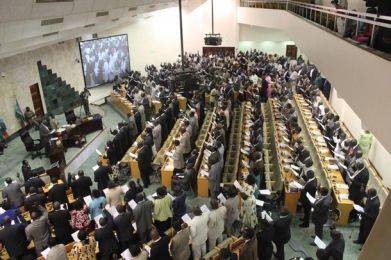S. Sudan: Auditor General implicates gov’t, parliament in financial losses
July 16, 2012 (JUBA) – At least six government ministries, a commission and Southern Sudan Legislative Assembly (SSLA) have been implicated by the Auditor General of alleged financial mismanagement in 2007, contrary to the Financial Accounting and Procedures Ordinance adopted by the country.

“Respect for the integrity of the budget remained a worrying challenge,” partly reads the Auditor General’s financial statement report for 2007.
“While some institutions were cash starved, others received, on the
discretion of the Ministry, more funds than were legally authorized,”
it adds.
The audit document, reportedly conducted in accordance with
International Organization of Supreme Audit Institutions (INTOSAI)
standards, involved examining, on a test basis, evidence supporting
the amounts and disclosures in the financial statements; assessing the
accounting principles used and significant estimates made by
management; examining to confirm whether public funds were expended
according to the budget and evaluating the overall presentation of the
financial statements.
A summary of the audit report, obtained by Sudan Tribune, covered nine
specific areas. These included; budget execution, oil revenues,
non-oil revenue, payroll and operating expenditures, procurement and
capital expenditure, bank and cash accounts, internal controls,
maintenance and asset registers.
In the report, for instance, the Auditor General faults the Ministry
of Cabinet Affairs of allegedly spending US$15,514,488, which it says
was 475% out of budget, while the same ministry reportedly exceeded
the budgetary payroll and operating expenditures by 202% and 112%
respectively.
The Education, Science and Technology Ministry, the Auditor General
noted, spent US$3,860,917 out of its allocated budget, and allegedly
used SDG 8 million, initially meant for ‘casual workers’ in a manner
unexplained.
Also implicated were the country’s Health Ministry, the SSLA, Ministry
of Legal Affairs and Constitutional Development, Finance and Economic
Planning, Sudan People’s Liberation Army (SPLA) Affairs, Internal
Affairs, and South Sudan Human Rights Commission (SSHRC).
According to Wondu, the human rights body, whose mandate is to protect
the fundamental rights of the country’s citizens, among others
reportedly over spent its budget lines by SDG 353,923, and allegedly
failed to surrender savings of SDG 2,871,173 to the Consolidated Fund.
Meanwhile, the Auditor General, in his declaimer accused the Interior
and SPLA Affairs ministries of not submitting documents for audit,
despite several attempts requesting them to do so through letters and
meetings.
“In view of this, I am unable to render an opinion on the financial
statements with respect to these ministries for the year 2007,” he
said in reference to the two ministries.
OIL REVENUE DISCREPANCIES
The Auditor General, in his 2007 audit dossier, says out of US$1.541
billion transferred to the Government of South Sudan (GoSS), according
to the Ministry of Finance and National Economy Petroleum Unit,
US$114.11 million was reportedly undisclosed in the 2007 financial
statement and the Audit Chamber got no assistance in its efforts to
trace this money.
In the same year, the report adds, the Government of National Unity
(GoNU) reportedly from GoSS oil revenue as direct expenditure, but the
Auditor General says no supporting documents were availed to the
southern government or it’s Audit Chamber.
“US$383.06 million due to GoSS had not been remitted by the end of
2007. We shall continue to track these outstanding balances up to the
end of the interim period,” said Wondu.
NON-OIL REVENUES
As South Sudan tries to rely on non-oil revenues to support its
economy, following oil shut down early this year, the Auditor
General’s report is likely to rub many people the wrong way. For
instance, according the audit findings, GoSS collected just 2% of
US$4,234,902 in a year when importers and domestic traders reportedly
raised complains of heavy tax burden, against its budgeted non-oil
revenue of US$217,457,136.
“Massive misappropriation and diversion of funds is the only
explanation to this state of affairs in the collection of non-oil
revenues,” the Auditor General told visibly terrified lawmakers.
He however said it remains the responsibility of the National Assembly
and President, Salva Kiir to take measures on matters raised in the
report as deemed necessary, in the interest of “good governance,
social equity and the rule of law.”
In May, Kiir wrote letters to 75 former and current government
officials asking them to account for nearly $4bn allegedly siphoned
from government coffers. The president, also said those will comply
will be exonerated from prosecution through amnesty.
VALUE FOR MONEY BREAK DOWN
The Auditor General, in his 2007 financial statement, also outlined
what he said the misappropriated funds, if it was properly spent and
accounted for, could have achieved. These included;
– The Ministry of Education, Science and Technology’s SDG 8 million
“misappropriations” for ‘casual work’ could have paid the salaries of
680 university graduate teachers for a year, saving tens of thousands
of children from illiteracy and ignorance
– The Ministry of Education’s ‘weekend allowance’ was an equivalent of
the salaries of 855 teachers in a month
– The Ministry of Education’s cash dishing of US$ 3,860,917 to
unverifiable ‘students’ could have educated 195 students through
Makerere University in three year degree courses
– The Ministry of Education’s cash withdrawals of SDG 7.8 million for
unspecified reasons, could have met the salaries of a further 666
teachers for a whole year
– The Ministry of Health’s cash hoard of SDG 3.3 million could have
met the salaries of 282 university graduate nurses for a year, saving
an unknown number of lives
– Missing oil revenue of US$114 million could have been enough to
import 3,800 heavy duty tractors. This could have significantly
reduced or even eliminated our dependence on imported food, alleviated rural poverty and generated additional sources of revenue for local and state governments
– The Assembly’s ‘hospitality allowance’ of SDG 2.2 million could have
met the annual emoluments of 182 graduate engineers.
(ST)
